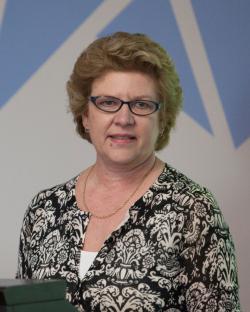Two former Athens-Clarke County commissioners are among the finalists to head the Athens Downtown Development Authority, along with a Washington, DC planner, and all three presented their vision for downtown Feb. 3 to an audience of business owners and county officials at Athens First Bank and Trust.
The candidates exhibited different strengths, and the decision could come down to two factors: whether ADDA board members want someone with a background in planning, business or a combination, and whether they value knowledge of the community over a potentially fresher and broader perspective. No matter which way the board goes, one thing’s for sure: Downtown is getting more pop-ups!
Linda Ford, who represented Five Points from 1999–2003, focused on her experience as a small-business owner and president of the Five Points Business Association. “We need businesses in Athens that provide high-paying jobs,” she said, noting Athens’ high poverty rate. “I want downtown to be a reason businesses come here.”
Ford said she would focus on “human capital” in drawing businesses to downtown—Athens’ creative community, UGA, the growing tech sector and others with “big ideas.”
She was concerned with the number of empty storefronts, especially in the new mixed-use developments on the outskirts of downtown. “When you’ve had empty space for a while, you need to start thinking outside the box,” she said. An “art walk” along Jackson Street to the Lyndon House could help fill those storefronts with artist studios, galleries and temporary “pop-up” art installations.
Family-friendly events would help expand the customer base beyond students, Ford said. While the ADDA doesn’t have the resources to plan such events, it could help encourage and market them through printed literature and social media sites like Instagram, she said.
Ford also emphasized the need for high-speed internet access downtown, not only for tech startups but for retailers. She said stormwater improvements and broadband fiber (and better landscaping) should be part of upcoming streetscape projects (although stormwater is already part of the plan for Clayton Street, and officials tried but were unable to convince internet providers to lay new fiber while streets are dug up).
Finally, Ford endorsed the idea of a downtown circulator shuttle, which she said would encourage families with young children to visit downtown and drivers to park in decks, because they wouldn’t have to walk several blocks to their destination.
William Herbig has perhaps the most impressive resume on paper. He is currently a program director at the Congress for the New Urbanism in Washington, DC, and former director of urban design for the Midtown Alliance in Atlanta. He studied architecture and historic preservation at Savannah College of Art and Design, and holds a bachelor’s degree in urban policy studies from Georgia State University and a master’s degree in city planning from Georgia Tech.
After spending his childhood in car-centric West Cobb, Herbig said he fell in love with urbanism at Disney World’s Main Street USA. “I’ve dedicated my career to building places people love,” he said.
Despite not having spent much time in Athens, Herbig still quickly identified what many residents view as problems facing downtown, such a tilt toward student-oriented amenities, the impact of an influx of national chains on homegrown businesses, a lack of jobs to keep UGA graduates in Athens and the city’s big dreams but limited resources.
Public-private partnerships could bring balance back to downtown, Herbig said; for example,
by encouraging developers to build senior housing. Apartments downtown are primarily student housing, and even though Athens often makes “best places to retire” lists, other than public housing, downtown doesn’t have anywhere for seniors to live.
Expensive projects in the downtown master plan could be done as pilots, he said. For example, rather than close College Avenue and turn it into a plaza, he said, ACC could experiment with two-laning one-way streets. And what few vacant commercial spaces there are could be utilized as temporary pop-up public meeting spaces. “Put the ADDA out there,” he said.
Other perceived problems aren’t really problems, Herbig said—parking isn’t the issue it’s made out to be; downtown could be cleaner, but it’s pretty clean already; two police forces (ACC and UGA) keep downtown safe; and there aren’t very many vacant storefronts.
Another former commissioner, David Lynn, has watched downtown change over the 30 years since he was a UGA student. “I think there were only one or two places you could buy a beer downtown,” he said.
Now there are more than 100, by his count. While Lynn said that “a good chunk” of downtown is still retail—about 60 establishments, primarily on Clayton Street—many people believe downtown is overrun with bars. “We don’t want to become an alcohol theme park,” he said. He also noted “the tale of two downtowns”—adults on the west side, and college students on the east side.
To diversify the business mix downtown, Lynn advocated two approaches: the traditional recruitment model, and working with landlords on short-term 30-day leases for pop-ups, startups and art installations. (Are you sensing a pattern here?)
First impressions are important, too, and Lynn said the ADDA should address issues like panhandling and trash, and continue a program that gives grants to property owners to fix up their buildings’ facades. Those are common challenges in cities everywhere, he said, but for many visitors and UGA students, “this may be the first city they’ve ever come to.”
On parking, Lynn advocated restricting reserved spaces in decks to 7 a.m.–6 p.m. to free up those spaces at night. Those who lease reserved spaces could still access the deck for free, but parking would be first-come, first-served. That would reduce frustration among drivers going out at night who see three floors of empty reserved spaces, he said.
Lynn also has a plenty of experience in planning. As a commissioner representing Prince Avenue from 2003–2010, Lynn led efforts to establish a downtown historic district and guided the development of the West Washington Street parking deck. He also has experience as a planner with Athens-Clarke County and advising local governments and state agencies with the UGA Carl Vinson Institute of Government.
Ultimately, the ACC government, not the ADDA, is responsible for implementing (or not) the downtown master plan. But candidates were asked, and Lynn said his priorities would be the art walk, which could host events like Tucson, AZ’s Second Saturdays; green space around City Hall (on hold for more than five years); fixing up the Costa Building next door and giving its alley the Farm 255/Iron Factory treatment; and a stormwater detention facility/park between the Multimodal Center and the Classic Center, which he thinks has Atlanta Beltline potential.
Lynn was laid off during a round of budget cuts at UGA in 2010. He switched careers and is currently a corporal with the UGA police department. “I like walking the streets,” he said. “I like spending time with people.”
The three finalists were chosen Jan. 25 from among 50 applicants. The ADDA board is tentatively scheduled to vote to hire a new executive director Friday, Feb. 10.
Like what you just read? Support Flagpole by making a donation today. Every dollar you give helps fund our ongoing mission to provide Athens with quality, independent journalism.












